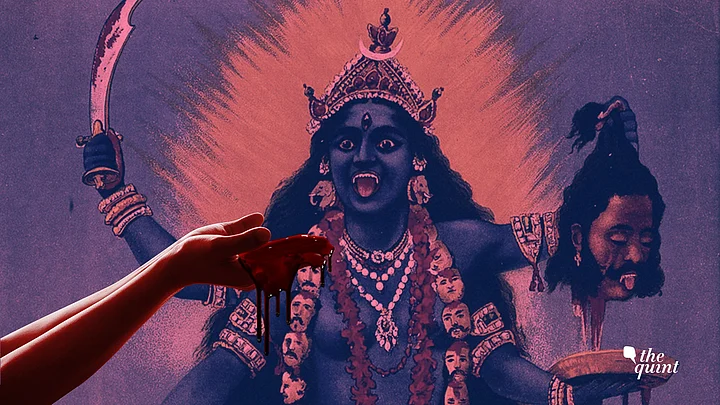Bali, or sacrifice, is central to the worship of goddess Kali. From goats and roosters to sugarcane and pumpkin, a variety of eatables are offered as bali to the goddess on Kali Puja, which falls on the new moon day of the Hindu-calendar month of Kartik. Tuesday, 6 November, happens to be that day, this year.
Kali is among a range of deities in Hinduism who are fierce and demanding and who, as the scriptures say, must be propitiated with the blood of animals.
The Yajna Paribhasa Sutras for instance, clearly identify “vegetal oblations” and “animal oblations” including blood, as two types of offerings for the goddess.
But does Kali also demand the blood of humans? Many of our ancestors thought so, and human sacrifice was widely prevalent in many parts of the country.
Human Sacrifice: Widely Prevalent But Under-Reported
Several famous temples have hoary histories of nara-bali or human sacrifice behind them. In some places, like the Kamakhya temple in Assam, human sacrifice continued well into the 19th century, and there are intermittent demands to reinstate the practice every now and then.
Human sacrifice was also part of ritual worship in several cults focused on the practice of Tantra. In fact, bali continues to be prescribed by several self-styled tantriks today as a means to appease the goddess, overturn bad fortune, or bring in good fortune.
It was only in 2014 that the National Crime Records Bureau (NCRB) started collecting data on human sacrifice. The statistics with the bureau reveal a disturbing picture: there were 51 cases of human sacrifice spread across 14 states between 2014 and 2016.
Activists stress that this number is a gross under-representation of the actual number of cases. Hamid Dabholkar, part of the Maharashtra Andhashraddha Nirmoolan Samiti (Committee for the Eradication of Superstitious Beliefs Maharashtra, or MANS), for instance, says that while NCRB has recorded only two human sacrifice cases in Maharashtra during the period in question, MANS’ data shows there were at least seven such cases.
Superstition & Mediated Beliefs
“Most such cases involve a tantrik/ godman, who tells his hapless, often poor and uneducated devotees, that offering the blood of another human being would appease the goddess,” says Dabholkar, son of slain rationalist Narendra Dabholkar, a co-founder of MANS.
In fact, Dabholkar was one of the authors of a bill aimed at banning and penalising human sacrifice, black magic and other superstitious practices. The Maharashtra Assembly adopted this bill, after suitably modifying it, in 2013, thus becoming the first state in the country to have such an anti-superstition law.
Although cases of human sacrifice are common in Bihar, Jharkhand and Uttar Pradesh— evidenced in reports in vernacular newspapers — there is no law similar to that in Maharashtra in these states. Manas Halder, a practitioner of Tantra who lives in Kolkata, says human sacrifice is prevalent in parts of West Bengal too.
“There are many frauds who call themselves tantriks and prescribe human sacrifice as the cure to all ills,” Halder tells The Quint. “But such activities are carried out in extreme secrecy.”
A Distortion of Tantra
Scholars on Hindu goddesses, their cults and practices stress that deities like Kali are much like humans who worship them. Like the latter, they could be demonic: these goddesses could fly into a rage, be unreasonable, vengeful, and egotistic, in turn affecting the well-being of their devotees.
In fact, festivals are occasions when the goddess “confronts and overcomes the demons” within her, David Kinsley tells us in his tome Hindu Goddesses: Visions of the Divine Feminine in the Hindu Religious Tradition.
Kinsley also claims in his book that, villagers help Kali in this struggle by offering sacrifices, including that of animal blood, so as to “invigorate her in contest with demons”.
Often, especially in Tantrik practices, animal blood is interpreted as human blood, and human sacrifice is seen as a necessary part of worship, meant to empower the goddess in her fight with her demons. Some Tantrik texts even provide scriptural grounding for such practices.
“Kalika-purana, a Tantric text of from the 12th century, has an entire chapter on the procedure of human sacrifice, and it states that the sacrifice of a man would keep the goddess Kali pleased for a thousand years,” Abraham Eraly tells us in The First Spring: The Golden Age of India.
Both the Sacred & Profane Are Within Us
But in fact, Tantra has nothing to do with human sacrifice, say religious studies scholars. Deepak Sarma, professor of religious studies at Case Western Reserve University, says contemporary tantrics who perpetrate human sacrifices, are “antinomian elements” who have misinterpreted the tantric tradition.
Halder, who teaches in a law college in Kolkata and has been learning Tantra for the past several years from a guru, agrees.
“Tantra sadhana (path of self-realisation) involves going beyond the sacred / profane binary,” he says. “We do this not by turning away from all that is considered dirty and morbid, like faeces, urine and dead bodies, but by eating them, and thus acknowledging that the sacred and profane reside within us.”
“But nowhere, at any level of sadhana, is human sacrifice part of Tantra,” stresses Halder. “Those who advocate and prescribe it are clearly misled and misinformed!”
(The writer is an independent journalist and researcher, and currently teaches at a college in Bengaluru. He can be reached at @b_aritra on Twitter and Instagram.)
